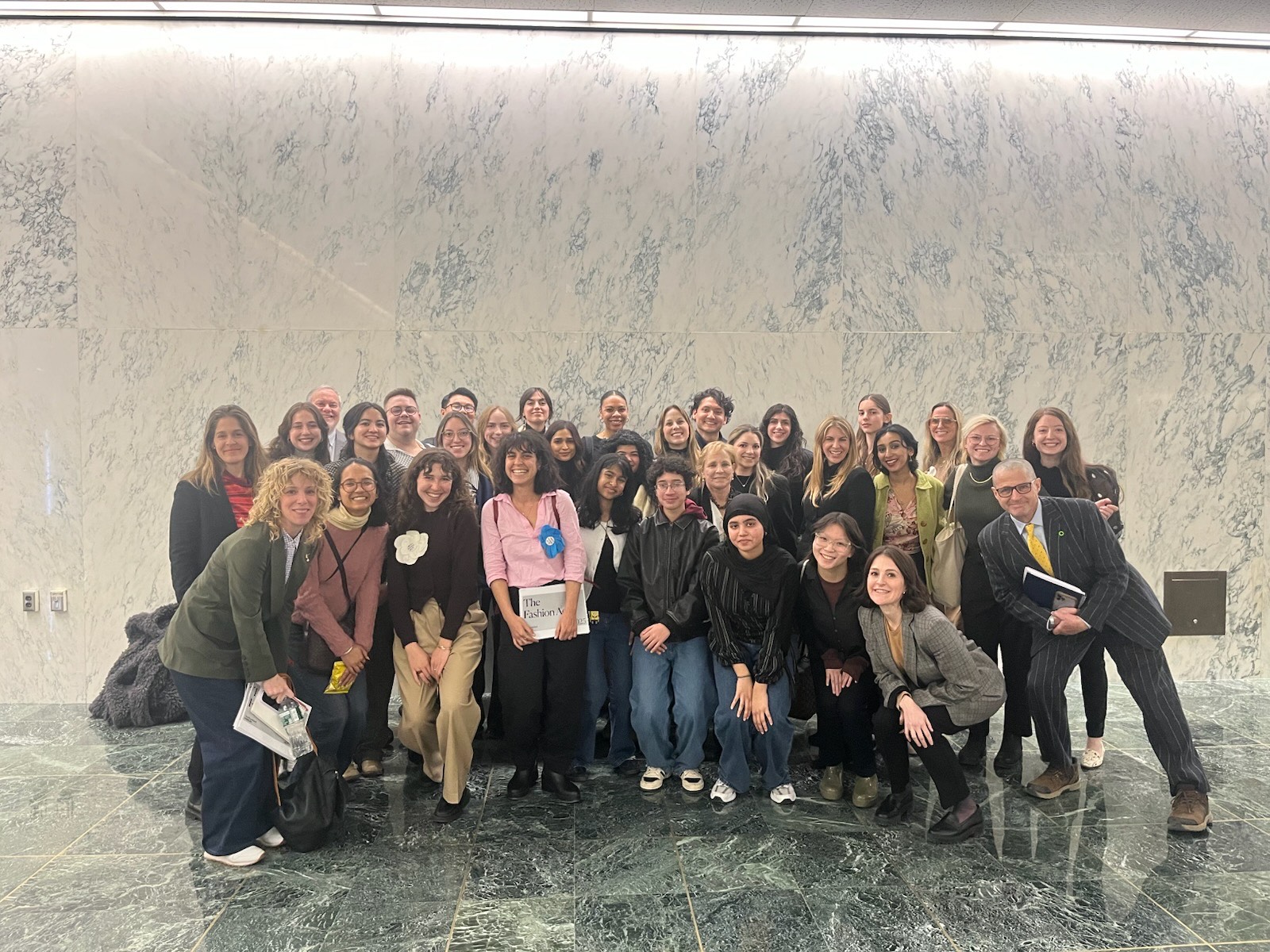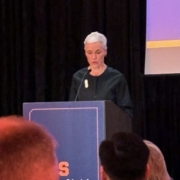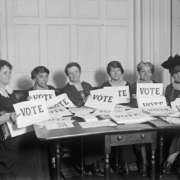Early Days: Investigate, Agitate, and Legislate, by Author and Journalist Kirstin Downey
OUR BEGINNINGS
The National Consumers League (NCL) got its start in the 1890s when a little boy fell ill in the dead of winter.
Josephine Shaw Lowell, a Massachusetts social reformer working with the poor, learned that an 11-year-old retail worker had contracted pneumonia after working six days a week, from early morning to midnight, during the Christmas shopping season. By January, he was still clinging to life on a hospital cot in New York City.
In those years, there were few legal limitations on work hours or restrictions against employing children, who were paid lower wages than adults.
The situation opened Lowell’s eyes to an ugly reality. As America industrialized, while some became wealthier, workers were being asked to work longer and harder, without rest breaks and safety precautions to protect their health.

Josephine Shaw Lowell (1843-1905) Source: Schlesinger Library, Harvard Radcliffe Institute
Incensed by the boy’s plight, Lowell called a meeting at her home, asking her friends— including women trade unionists, retail workers, and merchants—to join together to find ways to improve working conditions in New York City. They started planning for a program to convince employers to treat their workers more humanely.
Lowell and her friends quickly realized that voluntary measures would not suffice in the battle against abusive working conditions. They began organizing groups across a handful of cities to discuss the issues, investigate conditions in their communities, and push for legislative change. They called themselves the Consumers League because they hoped to use their combined power as customers to push businesses into improving conditions for workers.
According to Lowell, their efforts were “part of a historical continuum in women’s activism, invoking women’s patriotic refusal to buy British goods in the revolutionary era and female abolitionists’ boycotts of slave-made goods,” wrote author Landon R. Y. Storrs in her book, Civilizing Capitalism.
In 1905, Lowell died, but the torch had already been passed to Florence Kelley, a Quaker from Philadelphia who had been living in Chicago and who stepped forward and became the group’s executive secretary. The group was formally chartered in 1899.
Eventually, NCL began to press for federal legislation that would include adoption of minimum wage laws, limits on hours, unemployment insurance, and food and safety regulations. In fact, the work NCL did would establish the foundation for what would, some three decades after Lowell’s death, become known as America’s New Deal.
NCL’s fight against abusive child labor, sparked when a boy got sick from overwork more than 125 years ago, is ongoing.
FLORENCE KELLEY

Florence Kelley (1859-1932).
Photo by Underwood & Underwood Studios, New York
The National Consumers League (NCL) was originally based in individual city or state chapters, starting with the founding organization in New York City. But it became increasingly obvious that the organization needed to be national in scope, not just local.
This transformation was carried out by Florence Kelley, a lawyer and workplace reformer living in Chicago at Hull House, a settlement house founded by Jane Addams. She had joined the League early, spearheading an Illinois chapter.
Knowledgeable and visionary, she had served as the state’s tough-minded chief factory investigator during the administration of Illinois Governor John P. Altgeld, a progressive reformer. However, Altgeld lost his reelection campaign, and Kelley found herself out of a job as well.
One of NCL’s most active supporters, John Graham Brooks, a sociologist and labor investigator, seized this opportunity and traveled to Chicago to invite Kelley to become secretary of the new national venture. In addition to her professional training and experience, Kelley had an unusual political background that made her invaluable to that effort.
Her father, William D. Kelley, had been a 15- term U.S. congressman from Pennsylvania who had, at one point, served as chairman of the House Ways and Means Committee. He was a Republican who had been a friend of Abraham Lincoln. This meant that Kelley’s political views in many ways paralleled those of the League’s founders and that she also possessed intimate, firsthand knowledge about how legislation is proposed, defended, and passed. She was no stranger to Washington.
Kelley was immediately intrigued by Brooks’s offer, as she believed change was in the air.
“In all directions there were in those days stirrings of curiosity, and actual promise of sustained interest in the conditions of labor of women and children,” Kelley later recalled in a magazine article published in 1929. “Only organizations on a national scale were lacking.”
She was hooked. She accepted the position on May 1, 1899, and moved to New York City. The new group was formed, first known as the National Federation of Consumers Leagues, and later simplified to the National Consumers League. It set up its headquarters at the United Charities Building at 105 E. 22nd Street, surrounded by like-minded reform groups.

Factory Inspectors Past and Present. From left to right: Miss Ella Haas, State Factory Inspector, Dayton, Ohio. Miss
Mary Malone, State Inspector Ten-Hour Law, Delaware. Mrs. Florence Kelley, Chief State Factory Inspector of
Illinois, 1893-97. Miss Jean Gordon, Factories Inspector, Parish of New Orleans, 1908. Miss Madge Nave, Factory
Inspector, Louisville, Kentucky. Mrs. Martha D. Gould, Factories Inspector, Parish of New Orleans. Photo by Lewis W.
Hines, March 1914
Kelley leaped into action. When she launched the national group, it had only four regional chapters—New York, Massachusetts, Pennsylvania, and Illinois. But Kelley was magnetic and energetic, and she soon attracted other supporters. She traveled indefatigably to spread the word, carrying her own suitcase and lodging in spartan hotels to save money. In 1903, she spoke at 130 meetings in 19 states; in 1904, she addressed 108 gatherings in 14 states. By 1912, the league had grown to include 56 branches in 19 states, with 39 college branches as well, according to NCL’s annual reports for those years.
Kelley also found time to advance civil rights. Her name can be found in the original charter of the National Association for the Advancement of Colored People, now known as the NAACP, and was a vice president of the National American Woman Suffrage Association, promoting women’s right to vote.
Kelley and her fellow social justice advocates worked together to confront issues on many fronts—child labor, tenement work, unsanitary and unsafe working conditions, excessive work hours, and low wages. They also addressed food-safety issues, including lobbying against the sale of contaminated food and adulterated drugs, laws to require pasteurization of milk, and broad access to typhoid vaccinations.
Their motto: “Investigate, agitate, legislate.”
By 1906, they had racked up a string of successes. They had helped establish the U.S. Children’s Bureau, which studied and reported on children’s well-being, including exposing worrisomely high infant and maternal mortality rates. They played a major role in the passage of the Pure Food and Drug Act and the Meat Inspection Act, both signed into law in 1906 by President Theodore Roosevelt.
Kelley and her colleagues pressed lawmakers to pass legislation that would outlaw the worst of the problems they uncovered. They fought most of the battles at the state level, looking for every way they could make small improvements, reducing hours in one place from 60 to 54 and raising the permissible age for child labor from 12 years to 14.
But they also despaired as some of their greatest legislative victories were overturned as unconstitutional by the federal courts. In the 1920s, amid a conservative backlash that sought to undo many of their successes, the legal challenges were mounting, and even Kelley, indomitable as she was, was growing weary.
That’s when another of NCL’s guiding lights came to the public forefront: A young social worker named Frances Perkins, who had worked in the League’s New York office from 1910 to 1912, took the training she had received from Kelley and began building on what she had learned.
Perkins would help vault NCL into the national arena and turn the legislative victories they had achieved on the state level into enduring federal statutes.
FRANCES PERKINS

Frances Perkins (1880-1965), Source: francesperkinscenter.org/learn/her-life/
During the three decades that she ran the National Consumers League (NCL), Florence Kelley crisscrossed the country, talking to audiences everywhere about working conditions in industrializing America while seeking to recruit people who would join her efforts to find remedies for problems she felt were threatening human life, dignity, and happiness.
During one swing through New England in 1902, she was invited to speak to a group that included a young woman student at Mount Holyoke College named Fannie Coralie Perkins, the middle-class daughter of a stationery store owner. Perkins was enthralled by Kelley’s speech, and she quickly enrolled as a member of the group. After graduating from college, Perkins found her way to Chicago to Hull House, where Kelley had lived and worked and where social reformers were working to better the lot of the working poor. The young social worker was consciously modeling her life on Kelley.
A few years later, after completing a master’s degree at Columbia University, Perkins was hired as director of NCL’s New York City office, which was also the hub for the national organization. There, she worked directly alongside Kelley, learning from and being mentored by her. Perkins, who by then had changed her first name from Fannie to Frances, remained on NCL’s payroll for about two years.

Triangle Shirtwaist Factory fire in which 146 seamstresses died, mostly immigrants, many jumping from the upper two floors of a ten-story building. March 25, 1911
In that job, Perkins won state legislation giving most women in New York a 54-hour workweek, an important and valuable reform for employees who had been required to work many more hours each week. She also began a comprehensive study of workplace fire hazards, which caused numerous fatalities annually.
Perkins gradually became Kelley’s most important acolyte. Smart and hardworking, but more diplomatic than the fiery Mrs. Kelley, Perkins ended up being recruited for a series of government jobs administering labor law and doing exactly the kind of work that Kelley had envisioned could bring genuine improvements to the American workplace.

Triangle Shirtwaist fire victims in coffins on the sidewalk, March 25, 1911
Perkins shot into the political limelight in March 1911 in the wake of the Triangle Shirtwaist Factory fire, which tore through a high-rise industrial building in Greenwich Village and killed some 146 workers, most of them young immigrant women—some only 14 years old. They had been trapped inside because the doors were locked to prevent theft. Perkins had been visiting a friend nearby when the fire erupted, and she was an eyewitness to the disaster.
A handful of New York City activists, funded by wealthy philanthropists, decided to create a new advocacy group called the Committee on Safety to look into the causes of the inferno. Former President Theodore Roosevelt, who knew of and admired Perkins’s record of success in the state legislature, suggested her as the best person to head the fledgling organization. As Kelley did in her own life, Perkins threw herself into action.

Secretary of Labor Frances Perkins before her address to the Conference of Industry and Labor Today. Photo by Harris & Ewing, December 11, 1936
As secretary of the Committee on Safety, Perkins sought to keep the accident alive in people’s minds while she worked with industrial safety experts to devise reforms that could minimize the death toll from workplace fires and other industrial accidents. Her friends from NCL, including Kelley, testified as to the poor conditions they had observed in factories, canneries, and retail stores.
With the support of legislative allies, Perkins helped arrange and conduct hearings across the state over the next four years to illuminate these problems and explain the legal fixes that could make workplaces safer. Their work ultimately included establishing building occupancy limits, requiring fire escapes and exit signs, and encouraging the installation of sprinkler systems that reduced the chances that people trapped in fires would die. These ideas spread across the country and then across the globe.
One of Perkins’s friends in the state legislature, Al Smith, rode these popular legislative successes to victory as governor of the state, and he appointed Perkins to a series of state administrative positions overseeing labor law. Then, when another ally, Franklin Delano Roosevelt (FDR), became governor of the state, he placed Perkins in the top job as New York state industrial commissioner. Perkins was able to oversee the administration of the laws she had helped to draft to make sure they worked properly and effectively.
In 1929, as she was inducted into office as industrial commissioner, Perkins wrote to thank Kelley for believing in her. “To the very last ounce of my ability, I shall try to do what you expect of me, and partly I shall try because it is you who is expecting so much,” she wrote. “Your demand for good work and results has always been an inspiration, quite as much of an inspiration, I think, as your continual stream of new ideas!”

President Franklin D. Roosevelt signs the Social Security Act into law while Secretary of Labor Francis Perkins looks on, 1935.
Source: https://www.fdrlibrary.org/perkins
Kelley told Perkins she was confident that Perkins would make a difference. “There will be less death, misery and poverty because you are at the helm,” she wrote her.
In 1932, FDR was elected president, and he named Perkins his secretary of labor. She warned him that she would not take the job unless he permitted her to do her best to enact a much more expansive suite of labor reforms—many of which had been the long-held dreams of Kelley and her friends at the League—on the national level. He agreed. She stayed by FDR’s side in the cabinet, a close ally to the president, for the next 12 years.
Now, Perkins was in a position to help implement the proposals, with active lobbying support from NCL. Kelley’s draft plan for aid to people who lost their jobs— something she had been working on in the 1920s—became known as unemployment insurance. It became federal law as part of the Social Security Act, which passed in 1935. Child and maternity programs of the kinds Kelley had long advocated found permanent funding through the same programs, along with old-age pensions.
In 1937, the passage of the Fair Labor Standards Act brought new benefits to millions of workers in the form of a minimum wage, work-hour limitations, and a federal ban on child labor. Perkins was disappointed that some worker groups didn’t initially get coverage, and she and the League set to work broadening eligibility so that more people would be included—ultimately, that challenge was passed down to future generations to accomplish.
Kelley never saw the fruits of her labors. She succumbed to illness and old age, dying in 1932 at the age of 75, never knowing that her protégé would soon find the means to implement so many of their dreams.
But Kelley’s memory and the importance of what she had accomplished proved inspirational to League backers. In 1939, Perkins gave a keynote address to NCL allies who had gathered at the Hotel Astor in New York City.
Perkins told them that she had been honored to be elevated to the posts of New York state industrial commissioner and then U.S. secretary of labor, but that she believed, in fact, it was NCL that deserved the credit.
“I wasn’t the person who was appointed … but it was the Consumers League who was appointed, and that I was merely the symbol who happened to be at hand, able and willing to serve at the moment,” she told the group.
______________
– Kirstin Downey is a member of NCL’s Board of Directors and author of “The Woman Behind the New Deal: The Life of Frances Perkins, FDR’s Secretary of Labor and His Moral Conscience,” Nan Talese/ Doubleday Publishing, 2009. Sources: “How the New Christmas Was Born,” Florence Kelley, Harper’s Bazaar, 1911, National Consumers League collection, Library of Congress; “50 Years—The National Consumers League,” by Josephine Goldmark, The Survey, December 1949, NCL collection, Library of Congress; Florence Kelley and the Nation’s Work, Kathryn Kish Sklar, Yale University, 1995; Civilizing Capitalism: The National Consumers’ League, Women’s Activism, and Labor Standards in the New Deal Era, Landon R. Y. Storrs, The University of North Carolina Press, 2000; “Thirty Years of the Consumers’ League,” Florence Kelley, The Survey, Nov. 15, 1929, National Consumers League Collection, Library of Congress; NCL annual reports, 1903 to 1916, Library of Congress; The Woman Behind the New Deal, 2009; Florence Kelley to Frances Perkins Jan. 17, 1929, and Frances Perkins to Florence Kelley, Jan. 30, 1929, NCL collection, Library of Congress; NCL Thirty-Ninth annual meeting, Dec. 8, 1939, NCL collection, Library of Congress.


































